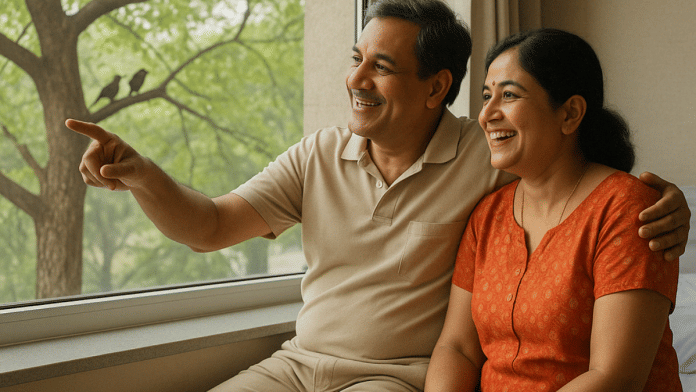Thank you dear subscribers, we are overwhelmed with your response.
Your Turn is a unique section from ThePrint featuring points of view from its subscribers. If you are a subscriber, have a point of view, please send it to us. If not, do subscribe here: https://theprint.in/subscribe/
As I stood at the door, Arun sat on the ledge of his hospital room window, pointing at something outside to his wife, Meenu seated beside him. It was 8 in the morning — both were bathed and dressed in fresh clothes — laughing, as cheerful as the birds chirping on the branches of a large tree leaning perilously close to the building. They looked happy, their faces glowing in the soft morning sunlight drifting through the window.
With every step I took into the room, my heart sank deeper. I had been entrusted with the thankless, heartbreaking task of turning their world upside down.
Arun was my cousin — but he was much more than that to me. My closest friend, sole confidante, and soulmate — a bond that grew over the years as we came of age together, and stayed strong even after we drifted apart geographically. Though he lived in Dubai, we kept in touch often and met during every trip — his to India, and mine to wherever — always routed through Dubai.
A fortnight before that life changing morning, he had called me to say he had a nagging stomach pain that wouldn’t go away. A doctor in Dubai had dismissed it as indigestion. When it worsened, we urged him to fly down to India. He came straight from the airport to one of the best hospitals in town, got admitted, and underwent diagnostic tests.
The doctor called me in first.
The pronouncement was grim. He had three months left – six, at the most.
I called his brother to share the devastating news. He broke down and confessed he wouldn’t be able to break the news to Arun or his wife. He asked me – pleaded, actually – to do it for him instead.
Doctors in India generally don’t break bad news to the patient. They inform the family, and the family decides whether to tell the patient or not. Nine times out of ten, the family chooses silence.
Even when my father was diagnosed with stomach cancer in 1996, the doctor informed me and my sisters – and not our father – and it was then up to us to bear the cross the way we wanted to. We were informed he had just about three months left. Considering the hopelessness of the situation, we thought it better to withhold the information and let him live those remaining days in peace – with the belief that things would improve. Maybe obliviousness, in some mysterious way, might help him live longer. Or maybe even heal him?
I did the same with Arun. I sugar-coated the truth. I told them the doctor was optimistic and that with treatment, he could recover. The twinkle of relief in their eyes – Arun and Meenu – more than made up for my guilt.
In both instances, as days passed, my father and Arun deteriorated. Still, never once did they question the reality of their illness. And if at all they knew – or suspected – they never uttered a word. Did they stay silent to spare us more pain? Or were they genuinely unaware?
In the West, patients are told the truth. They have a right to know. It’s considered ethical, respectful – even empowering.
But is that always the right choice?
Which is kinder: brutal honesty or protective silence?
Which is more moral or ethical: truth or hope?
And which, in the end, gives the dying a better death?
I still don’t know. And I’m sure I never will.
After all, this isn’t just a question of a truth versus a lie – it’s a question of how we choose to carry each other through suffering.
In the West, I believe the emphasis is on autonomy. The patient has the right to know everything about their body, their prognosis, and their future – however bleak. The idea is that truth facilitates control – offers the chance to set one’s affairs in order, on one’s own terms.
But in India, the burden of truth often shifts to the family. It is instinctive to protect – to shield the patient from despair, to give hope a longer leash, to ensure that the remaining days are lived with ease, not dread. It’s a form of collective caregiving, however emotionally taxing it might be for the family. An unspoken pact of love.
Neither approach feels fully right. Or wholly wrong.
Yes – Truth can empower, but it can also crush. Silence can comfort, and yet it can deceive.
Perhaps the real question is: What does the patient want? Not just in theory, but in his own heart during those particular days.
And perhaps the tragedy is that we will never truly know the answer – until it’s too late to ask.
Please follow me on Substack https://sunilsemail.substack.com/publish/posts
These pieces are being published as they have been received – they have not been edited/fact-checked by ThePrint.


